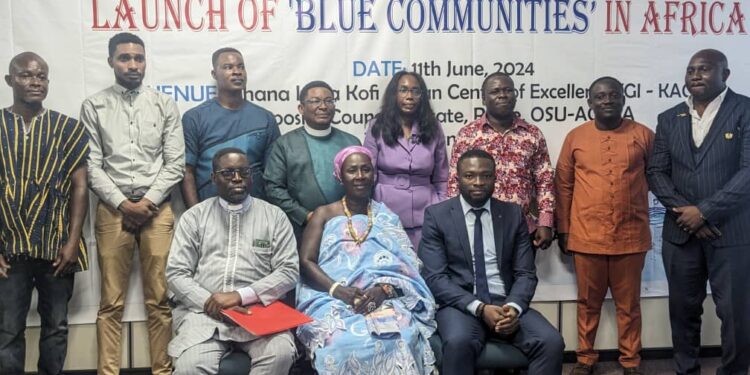Blue Community in Africa Launch: Deputy Finance Minister outlines Ghana’s commitment to water resource governance
As Ghana aligns itself with the principles of the Blue Community, it sets a precedent—a beacon of responsible water resource stewardship in a world where such practices are increasingly vital.
- Advertisement -
Deputy Minister for Finance, Dr. Alexander Ampaabeng, has unveiled the government’s ambitious plans on water resource governance and sanitation improvement in the country at the launch of the Blue Community in Africa Initiative.
Speaking during the launch of the Blue Community in Africa Initiative at the Ghana India Kofi Annan Centre of Excellence (GI-KACE), Dr Ampaabeng outlined the Finance Ministry’s strategy, which includes deploying water guards to oversee river bodies, bolstering regulation, and enhancing governance of water resources.
- Advertisement -
He noted that the Blue Community initiative aligns seamlessly with Ghana’s developmental goals as the country embraces the principle that water is a common good, essential for all life forms, and a fundamental human right.
- Advertisement -
“Today, I am here to reaffirm the Government’s dedication to these principles and share the significant strides we are making to safeguard our water resources and improve sanitation for our population,” he quipped.
Ghana’s dedication to Sustainable Development Goal 6—ensuring water and sanitation for all by 2030—remains steadfast, with notable achievements in water access and sanitation services. Since 2017, government investments have propelled an increase in basic drinking water services accessibility from 79% to 87.7%, alongside advancements in household toilet facilities and solid waste management.
The Deputy Finance Minister, speaking further, highlighted ongoing initiatives such as the sanitation and pollution levy, which generated GHS 472 million in 2023, providing sustainable funding for waste management. Moreover, the Rural Communities and Small Towns Water Supply Project by the Government aims to provide safe drinking water to over 282,000 people through innovative water filtration systems.
“Government has also established robust water quality monitoring and assessment programs that have helped identify pollution levels and taken corrective measures to enhance water quality. In 2024, these programs will be expanded by employing water guards to oversee and protect river bodies, addressing the challenge of Galamsey and its destructive impact on water resources,” he averred.
In addressing future challenges, Dr Ampaabeng outlined key strategies, including increased funding, public-private partnerships, community engagement, and sector reforms. Notably, the government remains committed to completing vital water supply projects across various regions, enhancing access to potable water for millions.
- Advertisement -
Concluding his remarks, Dr Ampaabeng reiterated the Government’s support to the Blue Community in Africa Initiative.
“Finally, I reiterate the commitment of the Government of Ghana to support the Blue Community in Africa initiative which aims to improve the management of our water and sanitation services. We commit to keeping up efforts to protect our valuable water resources for future generations, increase access to water and sanitation services, and improve the quality of water available to our people. Together, let us strive to create a future where every individual enjoys the right to clean water and improved sanitation,” he stated.
A “Blue Community” is one that adopts a water commons framework that treats water as a common good that everyone shares and is the responsibility of all. Because water is essential for human life, it must be governed by principles that allow for reasonable use, equitable distribution and responsible treatment in order to preserve water for nature and future generations.
Although the Blue Communities principles are supported by many international declarations, including the resolution adopted by the United Nations General Assembly in 2010 recognizing the human rights to water and sanitation, municipalities around the world are generally responsible for water quality, supply, treatment and conservation. The adoption of a water commons framework to address pollution, degradation, depletion, and privatization at the community level is therefore crucial in the battle to preserve water and ensure fair access to all.
As Ghana aligns itself with the principles of the Blue Community, it sets a precedent—a beacon of responsible water resource stewardship in a world where such practices are increasingly vital. Through concerted efforts, Ghana envisions a future where clean water and improved sanitation stand as pillars of societal progress and equitable development.
Source: Norvanreports
- Advertisement -


